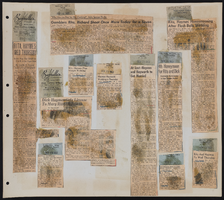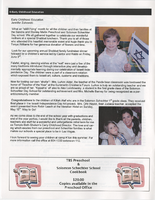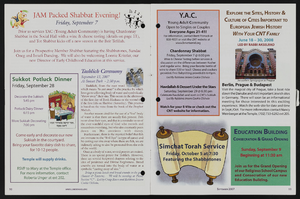Search the Special Collections and Archives Portal
Search Results
Saul Wesley oral history interview
Identifier
Abstract
Oral history interview with Saul Wesley conducted by David Schwartz on January 13, 2017 for the Slot Operations Oral History Project. Wesley discusses the distinction between the roles of a director and of a vice president in slot management. He also describes how the slot department works within various casinos such as the MGM Grand Hotel (now Bally’s) and the Monte Carlo Hotel and Casino.
Archival Collection
Pacifica Hotel Collection
Identifier
Abstract
The Pacifica Hotel Collection (1981-1985) contains newspaper clippings, correspondence, and contracts on the Pacifica Hotel, the first resort geared specifically towards the LGBTQIA+ community in Las Vegas, Nevada. The collection also includes one optical disc with a compilation of Las Vegas television news stories from the summer of 1985 about the Pacifica Hotel project.
Archival Collection
Tosha Tousant oral history interview [CLOSED]
Identifier
Abstract
[This collection is closed. See Access Note for additional information.] Oral history with Tosha Tousant conducted by David Schwartz on August 02, 2016 for the Slot Operations Oral History Project. In this interview, Tosant discusses their work at various casinos including Players International Lake Charles, Harrah's Lake Charles, Harrah's New Orleans, Horseshoe Cleveland, and Flamingo Las Vegas.
Archival Collection
Joan Gordon Family Films
Identifier
Abstract
The Joan Gordon Family Films (approximately 1930-1939) consist of two color 16mm films from the 1930s which feature Benjamin "Bugsy" Siegel and his daughters in a swimming pool in Los Angeles, California and other locations in Southern California. Also included are two reproductions of black-and-white photographs featuring Esther, Milicent, and Barbara Siegel along with Joan Gordon, her sister and mother. Joan Gordon grew up in Los Angeles, California and her family was neighbors with Benjamin and Esther Siegel and their daughters Millicent and Barbara.
Archival Collection

Alpha Kappa Alpha Sorority, Theta Theta Omega Chapter "Tea Rose Talk" newsletters
Date
Archival Collection
Description
From the Alpha Kappa Alpha Sorority, Incorporated, Theta Theta Omega Chapter Records (MS-01014) -- Chapter records file.
Text

Amber Diskin oral history interview: transcript
Date
Archival Collection
Description
Oral history interview with Amber Diskin conducted by Barbara Tabach on January 5, 2018 for the Remembering 1 October Oral History Project. In this interview, Amber Diskin discusses her experience at the Route 91 Harvest music festival during the October 1, 2017 mass shooting in Las Vegas, Nevada. Diskin talks about finding her way home after escaping the crowds and letting her family and friends know she was not hurt. She speaks of the aftermath of the shooting, including how her children were affected, the post-traumatic stress disorder she developed, and how the shooting has affected her love of concerts. As a native Nevadan, she shares her views of Las Vegas and how her sense of community deepened after this event. Diskin ends the interview by discussing her appreciation for the first responders and the gift baskets she helped distribute to hospitals, police stations, and the fire department.
Text

Preprint, Where I Stand: The Record of a Reckless Man, by Hank Greenspun with Alex Pelle, 1966
Date
Archival Collection
Description
Book proof with annotations from editors in the margins.
Text



